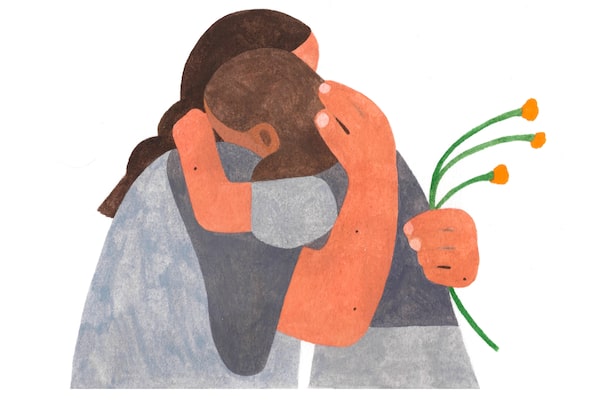First Person is a daily personal piece submitted by readers. Have a story to tell? See our guidelines at tgam.ca/essayguide.

Illustration by Mary Kirkpatrick
One morning last fall, my daughter woke up and padded to the potty, where she sat down sleepily. I met her there.
“The sadness about the baby is coming back,” she said, looking up at me. “Is yours coming back?”
“Mine has always been there sweetie,” I said. “Yes, I’m still sad about the baby.”
Norah had known about her baby sister since the spring, when she pointed at my tiny bump and said, “What’s that?” But two months later, after we’d bought a house across town to fit us all, we lost Norah’s sister. She was stillborn at 24 weeks, when Norah was almost three.
When this happened I spent five days in the hospital without warning. One day Norah went to school, and when she came home her dad and I were gone, leaving her with her grandma. The night we finally returned, she trembled with excitement watching us climb the front steps of our townhouse.
We told her the baby had died the next morning, and she threw her body back on our bed and wailed. “Nooooo!” she said. “But I wanted a baby!”
“So did we,” I told her. “We’re really sad. We’re so sorry.”
“But babies don’t die!” she said.
“Not usually,” I said, starting to cry. “But sometimes they do.”
Making babies had never been easy for us. Both Norah and her sister were conceived through IVF and later than I would have liked: my due date for Norah’s sister was four days before my 40th birthday. Back when I was pregnant, I thought with amusement that the baby was going to be a wild but wonderful birthday present. After the loss, I was in shock, and then denial. I told myself everything was going to be fine, removed any obvious photos of my pregnancy from our digital picture frame and focused on settling into our new house with the extra bedroom.
I found it difficult to be apart from Norah, even when she was just a few minutes away at preschool. When she was home, I didn’t leave her side. She’d practised being a big sister with Baby Fluff, swaddling her tiny bunny and changing its diaper. Now she could not fall sleep without Baby Fluff tucked under her pyjama shirt, as if the bunny was growing inside her. I too felt the baby’s absence in my body; I held Norah tighter and she held Baby Fluff.
It was only after my due date passed that I relented and let all the complicated feelings in: not only grief, but guilt, regret and anger. There were times when my pain was so immense that I could hardly breathe.
I wished I could tell Norah if the sadness would ever go away completely, or whether it would evolve into something more manageable and when approximately that would happen. But it was my first real experience with grief, too. It seemed so unfair that we were having this painful experience together. Here she was, her hands still so small in mine and she had to learn about being left behind by someone she loved. And yet, sometimes it felt that Norah was teaching me how to grieve: with simplicity, raw emotion and the courage of imagination it takes to love someone who never got to live in the world with us.
She often asked for another baby. We told her we were trying our best, but it might not be possible. What we didn’t explain was that we were trying again with IVF, but things were complicated and time was not on our side. One morning while we were getting ready for school, Norah again expressed her longing for a sibling and I gave her a more specific Plan B.
“If we can’t have another baby,” I told her, “we will be really sad and cry so much. And then we’ll say ‘okay, let’s go live a wonderful life together!’”
Norah beamed. “Okay!” she said. It surprised me how much I was comforted by this plan and her reaction to it.
As winter turned to spring, we slowly started to feel better. I found satisfaction in small things: a good night’s sleep, brunch with my family, taking Norah to the park to collect buttercups. She began to express her love with great dramatic flourishes – ”I love you to Mexico and the stars and back!” Her father and I saw that she really could have a wonderful life, even if she turned out to be an only child.
For a long time, the most painful part of losing Mabel was remembering how excited Norah was to be a big sister. When I was pregnant her preschool teachers had sent home a rather abstract work of art with Norah’s explanation written beneath it: “I’m happy because a baby sister is coming!” Even now, I can’t think about that picture without crying.
But somehow, slowly, impossibly, I’ve come to treasure even those painful memories. Those moments of excitement and delight were real and so was Mabel. Norah really is a big sister, even though her time with Mabel was much too short. Now when a photo of us appears on our digital picture frame from when I was pregnant, I feel something new. All four of us were there, I think to myself. There’s our family, all together.
Nicole Baute lives in Washington, DC.